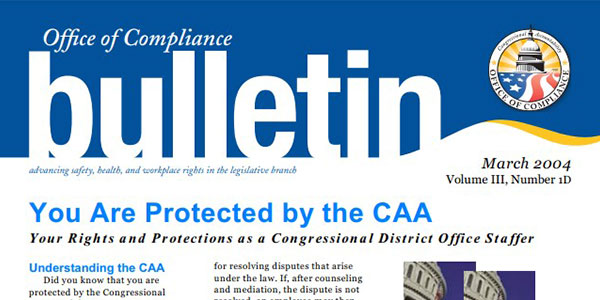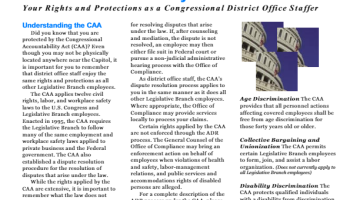Your Rights and Protections as a Congressional District Office Staffer
Understanding the CAA
Did you know that you are protected by the Congressional Accountability Act (CAA)? Even though you may not be physically located anywhere near the Capitol, it is important for you to remember that district office staff enjoy the same rights and protections as all other Legislative Branch employees.
The CAA applies twelve civil rights, labor, and workplace safety laws to the U.S. Congress and Legislative Branch employees. Enacted in 1995, the CAA requires the Legislative Branch to follow many of the same employment and workplace safety laws applied to private business and the Federal government. The CAA also established a dispute resolution procedure for the resolution of disputes that arise under the law.
While the rights applied by the CAA are extensive, it is important to remember what the law does not cover. Individual employing offices still maintain wide discretion in setting many workplace policies. Work schedules, job duties, salaries, vacation and leave policies, holidays, fringe benefits, or procedures for hiring and firing staff are not governed by the CAA.
Dispute Resolution
The CAA provides an alternative dispute resolution (ADR) process that emphasizes nonjudicial counseling and mediation for resolving disputes that arise under the law. If, after counseling and mediation, the dispute is not resolved, an employee may then either file suit in Federal court or pursue a non-judicial administrative hearing process with the Office of Compliance.
As district office staff, the CAA’s dispute resolution process applies to you in the same manner as it does all other Legislative Branch employees. Where appropriate, the Office of Compliance may provide services locally to process your claims.
Certain rights applied by the CAA are not enforced through the ADR process. The General Counsel of the Office of Compliance may bring an enforcement action on behalf of employees when violations of health and safety, labor-management relations, and public services and accommodations rights of disabled persons are alleged.

